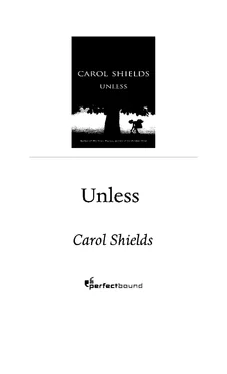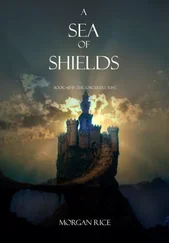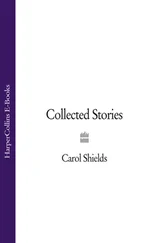Carol Shields - Unless
Здесь есть возможность читать онлайн «Carol Shields - Unless» — ознакомительный отрывок электронной книги совершенно бесплатно, а после прочтения отрывка купить полную версию. В некоторых случаях можно слушать аудио, скачать через торрент в формате fb2 и присутствует краткое содержание. Жанр: Современная проза, на английском языке. Описание произведения, (предисловие) а так же отзывы посетителей доступны на портале библиотеки ЛибКат.
- Название:Unless
- Автор:
- Жанр:
- Год:неизвестен
- ISBN:нет данных
- Рейтинг книги:4 / 5. Голосов: 1
-
Избранное:Добавить в избранное
- Отзывы:
-
Ваша оценка:
- 80
- 1
- 2
- 3
- 4
- 5
Unless: краткое содержание, описание и аннотация
Предлагаем к чтению аннотацию, описание, краткое содержание или предисловие (зависит от того, что написал сам автор книги «Unless»). Если вы не нашли необходимую информацию о книге — напишите в комментариях, мы постараемся отыскать её.
Unless — читать онлайн ознакомительный отрывок
Ниже представлен текст книги, разбитый по страницам. Система сохранения места последней прочитанной страницы, позволяет с удобством читать онлайн бесплатно книгу «Unless», без необходимости каждый раз заново искать на чём Вы остановились. Поставьте закладку, и сможете в любой момент перейти на страницу, на которой закончили чтение.
Интервал:
Закладка:
“I hate these shoes.” She wiggled in the chair.
“Well, we won’t buy them, then.”
“What kind of shoes did you have?”
“When?”
“At the pizza thing.”
“I’m not sure I remember. Oh, yes I do. We didn’t have shoes. We were barefoot.”
“Barefoot? You and Daddy?”
“It was summertime. A very hot summer day.”
“That’s nice,” she said. “I wish I’d been there.”
This was much too easy. “I wish you’d been there too,” I said, meaning it. “That would have made the day perfect.”
“So, is there anything new?” It was Emma Allen phoning a week ago from Newfoundland.
She has been a friend since high-school days in Toronto. There is no need for reference points between Emma and me. Our brains tick over in the same way. She is a writer, a medical journalist, a redhead, tall and lanky, who once lived, briefly, in Orangetown with her husband and kids and was part of the same writers’ workshop. We speak at least once a week on the phone. When she asks if there’s anything new, she is talking about Norah, about Norah living on the street.
“She’s still there. Every day.”
“That has to be some comfort,” she said in her measured way. “Though it’s not bloody much.”
“I worry about the cold.”
It was October, and we were having a frost almost every night. We’d even had a fall of snow, which had since melted.
“Thermal underwear?” Emma asked.
“Good idea.”
“On the other hand —”
“Yes?”
“The cold may bring her home. You know how a good cold snap makes people wake up and look after themselves.”
“I’ve thought of that.”
“I thought probably you had.”
Tom’s father was a family physician in Orangetown, so Tom became a family physician in Orangetown. It’s not really as simple as that, but the fallout is the same. When he was a student he was in rebellion against the established order, way over to the edge of the left. He didn’t attend his own university graduation, because the ceremony involved wearing academic dress. For ten years the only trousers he wore were jeans. He doesn’t own a necktie and doesn’t intend to, not ever — the usual liberal tokens. His instincts are bourgeois, but he fights his instincts. That is, he lives the life of a married man but balks at the idea of a marriage ceremony. Mostly, he is a different kind of doctor than his crusty, sentimental father.
Tom is a saint, some people in Orangetown think, so patient, so humane, so quietly authoritative. He works at the Orangetown Clinic with three other doctors, one of whom is an obstetrician who looks after most of the births in the region. Tom misses that, attending births. He sees a lot of sick people and a lot of lonely people. It’s through Tom that I’ve found out about the ubiquity of loneliness. I wouldn’t have believed it otherwise. t’s my belief that he thinks about trilobites all the time. While he’s checking out a prostate gland or writing a prescription for asthma drugs, a piece of his mind holds steady to the idea of 500 million years ago — unfathomable to me — and the extinct, unlovely arthropods that occupied every sea and ocean in the world. They hung around for a long time, something like a hundred million years. Some were half the size of a thumbnail and some were a foot long.
Recently, a giant trilobite was found near the shores of Hudson Bay, a monster measuring 70 centimetres — that’s two feet, four inches. Ugly but adaptable creatures, trilobites, and obliging with their remains. A head with bulging eyes, a thorax, a tail of sorts; a little three-part life that once was. Tom loves them, and so we all love them.
“So what!” says Christine when I confront her with a bent cigarette that I found in the pocket of her winter parka. “So why were you going through my parka anyway?”
“I was putting it in the washer and so I checked the pockets.”
“I’m not addicted, if that’s what you’re worried about.”
“That is what I’m worried about, yes.”
“Well, I’m not. I’ve just had a few. With friends.”
“When I was pregnant with you, Chris, I never had a drop of wine for nine months. I never took so much as an aspirin. I drank three glasses of milk, every day, and you know I hate milk.”
“Wow! You were a real martyr to the cause of motherhood.”
“I wanted you to be healthy.”
“So you could lay a guilt trip on me when I got older.”
“I just hoped —”
“No wonder Norah —” She stopped herself.
No wonder Norah left home. I looked into her stricken face and could read the words she had come so close to engraving on the air.
“It’s all right,” I said, gathering her in my arms.
“I hate smoking anyway,” she whispered. “It was just something to do.”
“Sooo-ooo-oo!”
That’s what people say when they are about to introduce a narrative into the conversation or when they are clearing a little space so that you can begin a story yourself. It can be sung to different tunes, depending on the circumstances.
“So!”
That’s usually the first word uttered when I sit down to have coffee with Sally Bachelli and Annette Harris and Lynn Kelly. So! Meaning, here we are again at the Orange Blossom Tea Room. We’re the Orangetown coffee “lie-dies” getting together on a Tuesday morning.
What’s new? So! So is like the oboe, signalling the A pitch to the strings. So, where do we go from here?
Aside from Emma Allen, and Gwen Reidman, with whom I’m rather out of touch, these three — Sally, Annette, Lynn — are my closest friends. We are all about the same age but are wildly different in size. Sally is a large woman, queenly. She has a round mouth in a round face and wears thick, round, plastic-rimmed eyeglasses. A former actress who now runs an after-school drama group, she’s brilliant with accents: Scottish, German, East Indian; she can do anything. Even her shoulders are theatrical, even her elbows and wrists. Her clothes, which she designs and makes herself, are extraordinary in their roomy, fluttering, brightly coloured and gathered shapes.
“So,” says Lynn Kelly, who wears matched pantsuits in muted tones with department store jewellery and flat shoes. She is the shortest of us, under five foot and very wiry. How she produced two children from those tiny hips is a mystery. She has large hair, though, to make up for lack of body size, thick, dark, luxurious hair all in a tangle. Every sentence she utters seems to have a full stop attached. She was born and educated in North Wales.
Annette Harris came to Orangetown from Toronto, and before that from Jamaica. When she says the word so, she makes a circle of it. Of all of us, she has the best figure, a model’s figure, slim-waisted, deep-breasted, wonderful legs, and beautiful hands. She dresses with austerity except for her collection of handmade silver bracelets and earrings. I met Annette in the writers’ group I once belonged to. She was writing poetry in those days, and still is. Her book Lost Things was published a year ago and has done very well. She gave a reading in Toronto, and people were fighting to get in.
So, what do the four of us talk about as we gather at the Orange Blossom Tea Room? We never think about the aboutness of talk; we just talk.
Today Lynn was talking about trust. She is an avid cyclist, and her bike was leaning against a lamppost just out of view of the window. “How do I know it won’t be stolen?” she asked us. “Why is it I’m absolutely sure it’s safe?”
“Because this is Orangetown,” Sally said.
“Because school’s in session,” I suggested.
“Because it’s a twenty-year-old bike.” From Annette. “Not that it isn’t a terrific model.”
Читать дальшеИнтервал:
Закладка:
Похожие книги на «Unless»
Представляем Вашему вниманию похожие книги на «Unless» списком для выбора. Мы отобрали схожую по названию и смыслу литературу в надежде предоставить читателям больше вариантов отыскать новые, интересные, ещё непрочитанные произведения.
Обсуждение, отзывы о книге «Unless» и просто собственные мнения читателей. Оставьте ваши комментарии, напишите, что Вы думаете о произведении, его смысле или главных героях. Укажите что конкретно понравилось, а что нет, и почему Вы так считаете.












